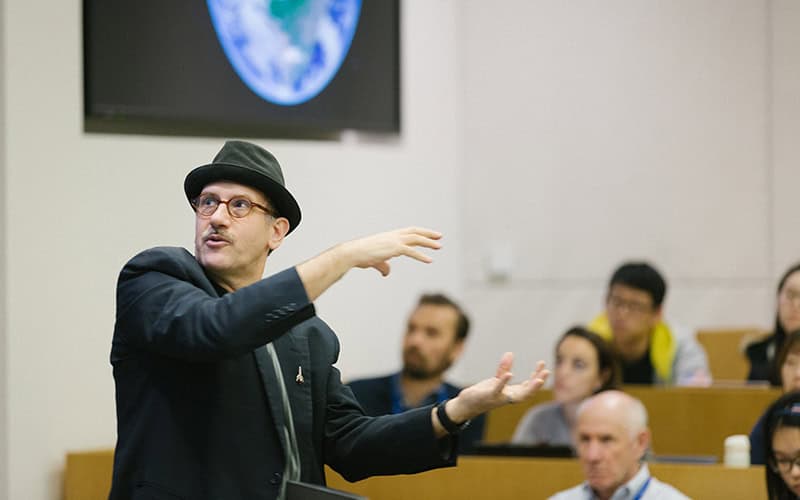
China’s success in germinating seeds on the far side of the moon has taken humankind a step closer to being able to survive on other planets, according to leading astrobiologist David Grinspoon.
During a recent talk at Duke Kunshan University, the American scientist and celebrated author highlighted the Chang’e 4 mission in January as a milestone for global research into the possibilities of spreading life beyond Earth.
China’s national space agency confirmed on Jan. 18 that cotton seeds had sprouted in a ‘garden’ on the moon probe, marking the first time humans have grown live matter on another planet.
‘Plants have been grown in space before, at the international Space Station, but never on the surface of another world,’ said Grinspoon, senior scientist at the Planetary Science Institute in the United States and a NASA adviser. ‘The seeds didn’t last long, but they were successfully germinated.
‘Thinking about the possibility of humans eventually trying to go and live on other worlds, we will not succeed in doing that unless we learn to grow plants elsewhere. So this is a baby step in that direction.’
Plants cannot make it to distant planets without humans, and vice versa, he said.
‘Our evolution as animals is tied to the evolution of plants on this planet; we wouldn’t be here today without plants. You can’t go it alone. If we want to go to Mars to live, not just to visit, we’ll have to learn how to build self-sustaining, ecological habitats. In other words, we have to create a simulation of what we have here on Earth.’
Grinspoon’s talk, on ‘Astrobiology and the Role of Humans on Earth and Beyond,’ was organized by the Planetary Ethics and Artificial Intelligence Lab, part of Duke Kunshan’s Humanities Research Center.
Astrobiology looks at the potential for life in the universe, and combines exploration of other planets with a study of the history of life on Earth in order to determine where else life may thrive, and how we can go about finding it.
After his talk on Jan. 21, Grinspoon took part in a discussion on space exploration with Duke Kunshan students and faculty, where he expanded on the implications and ethical debate that stem from such experiments as Chang’e 4’s ‘garden.’
The cotton shoots grown on the moon died when the experiment was ended ‘ the temperature on the lunar surface plummets well below minus 100 C after nightfall ‘ and they will decompose in enclosed canisters, according to the space agency.
‘It’s such a harsh environment on the moon that no Earth life can escape and start evolving and live on its own. We know enough about the moon and its conditions, so we can be confident there will be no aftermath,’ Grinspoon said, in response to an undergraduate student’s question about potential contamination.
Carrying out a similar experiment on Mars, one of Earth’s closest neighbors, would be more controversial, however.
‘Chances are the same thing would happen; the seeds would die, the radiation would kill them and nothing would happen. But you’re getting closer to an environment where we can’t be 100 percent sure that they wouldn’t go on and survive, so it’s ethically more tricky,’ Grinspoon warned.
For now, planetary protection rules ‘ international agreements signed by the world’s space powers ‘ forbid any exploration in potentially life-supporting areas of Mars, such as areas with liquid water near the surface. The rules are there to not only prevent forward contamination, which could affect indigenous organisms and scientific results, but also back contamination like bringing something dangerous back to Earth that could wipe out humanity.
Yet even with clear guidelines to follow, exploring the unknown always comes with the risk of disrupting indigenous species, throwing up ethical questions for humans looking to inhabit other worlds.
‘A lot of people want us to go live on Mars, and if we’re going to do that we’d have to bring a lot of other lifeforms with us. So as we move closer to this possibility, we’re going to have to grapple with ethical questions,’ the scientist said.
‘To me, the more we become convinced that a place is lifeless and not able to support life on its own, then the less ethically challenging it is. You can argue whether we should or shouldn’t send people to Mars, but the idea that we’re going to harm indigenous life becomes less likely as we learn more.’
One factor that could accelerate the ethical challenge is the huge amount of private capital that has started to flow into the space industry. Companies such as Elon Musk’s SpaceX, OneSpace and iSpace in China, and Richard Branson’s Virgin Galactic are investing heavily in the sector, with orbital tourism and logistic activities seen as potential profit engines.
‘If some billionaire decides they want to go to Mars and they’re not going to follow anyone else’s ethical guidelines, who can stop them?’ Grinspoon said. ‘It’s concerning. I don’t know if the private space explorers will honor those rules or be as concerned. But then again, maybe they will. It’s new territory. It’s not been the case for very long that private operators could go into space, but it’s going to be the case soon.
‘I don’t think it’s going to be that easy to contaminate Mars. I think Mars is probably lifeless. … But it’s good that we have these planetary protection rules because we could be wrong.’
About the speaker: Dr. David Grinspoon is an astrobiologist, senior scientist at the Planetary Science Institute and a frequent adviser to NASA on space exploration strategy. He was appointed the inaugural chair of astrobiology at the U.S. Library of Congress in 2013, and his book ‘Earth in Human Hands’ was named by NPR Science Friday as one of the 10 best science books of 2016.

